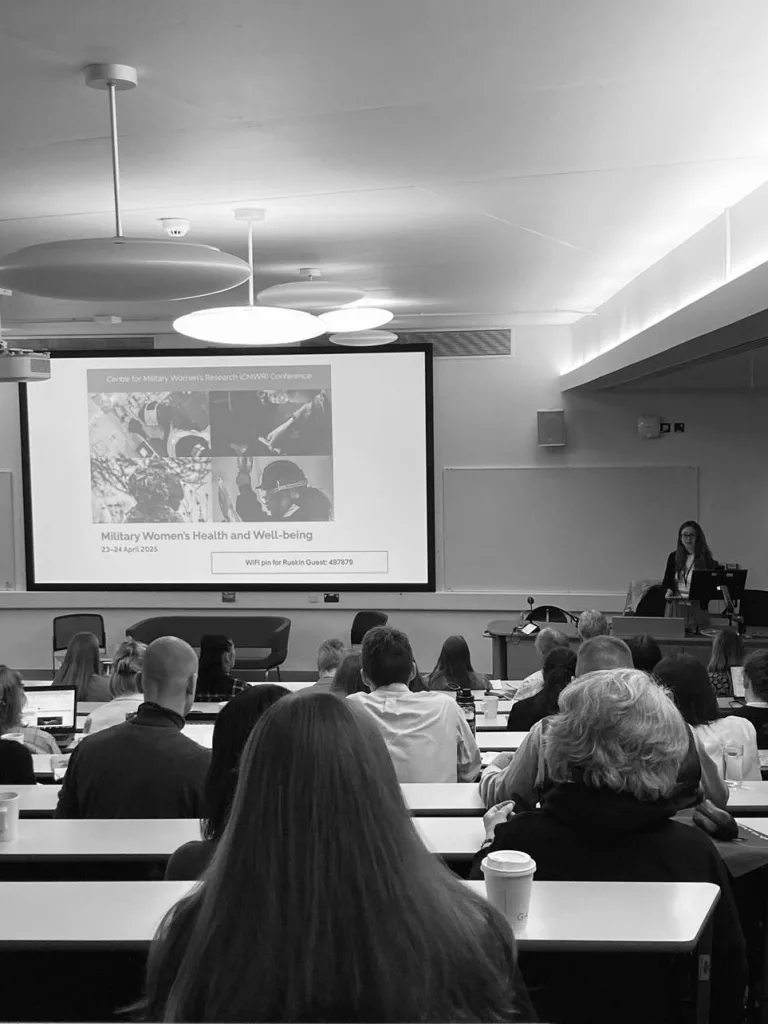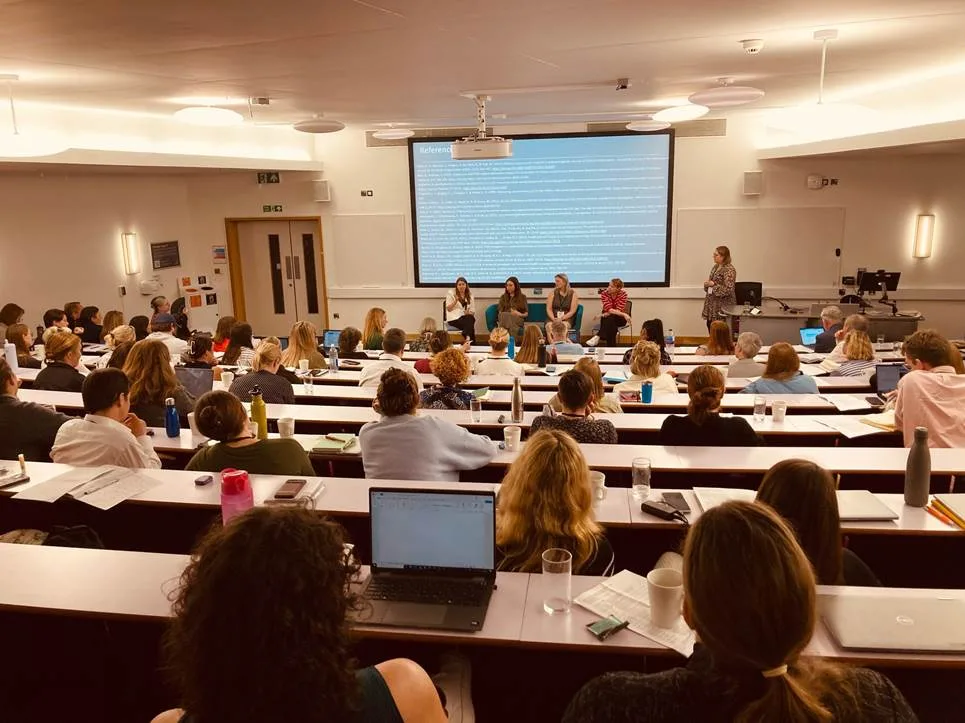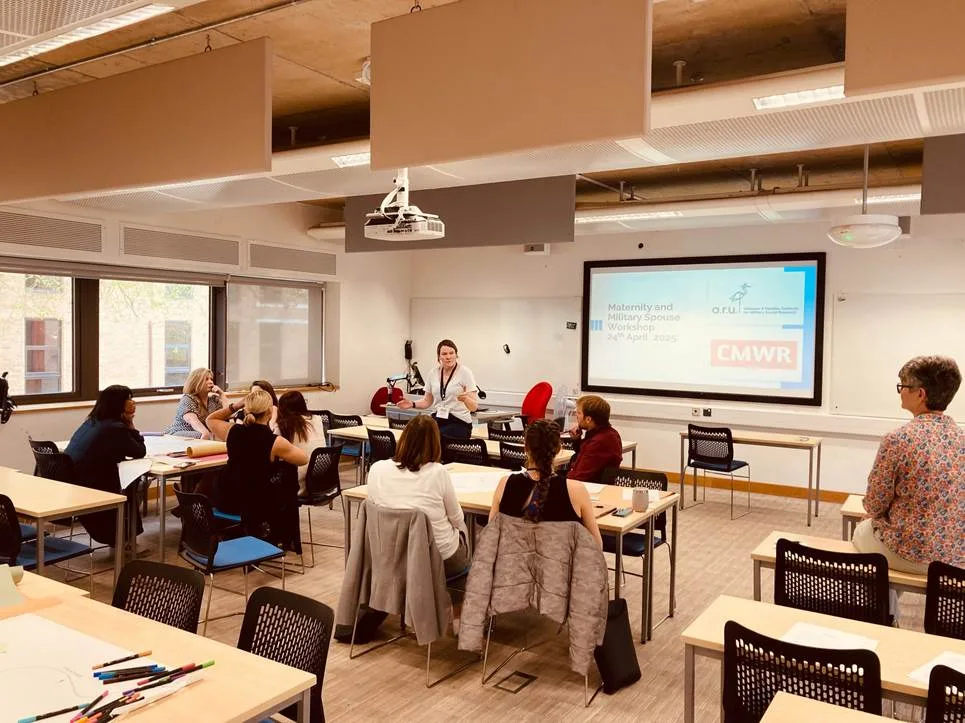Military Women’s Health
& Well-being
23/24 April 2025
Want to know what you missed at the latest conference from the Centre for Military Women’s Research? Read on to hear about our super programme packed with (not one, not two but) three keynote speakers, along with bumper panels, and catch up on what we got up to in our workshops.
23 and 24 April saw 90 delegates and 38 speakers descend on the ARU Cambridge campus for the second CMWR conference. This was a step up in numbers of attendees from the previous year and it was fantastic to see such a crosssection of practitioners, servicewomen, veterans, policy makers and academics in the room.

After a welcome address from Yvonne Barnett, Deputy Vice Chancellor, and Lauren Godier-McBard, Director of the CMWR, the first keynote was delivered by Surgeon Captain Kate King, Head of Academic Department of Military General Practice, UK Ministry of Defence, entitled ‘We don’t need to research women?’. This provocation, based on a question Kate had previously been asked, was followed by making a case for such research and shining a light on under-researched themes.

Our morning panel tackled the subject of ‘Women’s military experiences’ and included perspectives from the UK, the Netherlands and Australia, closing with a practice-oriented talk on the Sexual Assault Referral Centres.
- Amy Hill: Taking back the narrative: Putting servicewomen at the centre of military gender research
- Emiel Maliepaard: Women in the military: linking a gendered division of labour and (lack of) perceived social support
- Natalie Merryman: Dazzled and distorted: cultural camouflage concealing misogyny, gendered violence and identity harm experienced by women military veterans
- Fiona Stainthorpe & Emma Hatfield: Sexual assault whilst serving: commissioning a forensic nurse advisor (military) as part of the regional sexual assault referral centre (SARC) service
Second up was a panel addressing ‘The health of women in the military community’ and was preceded by a keynote delivered jointly by Dr Lauren Godier-McBard (Director of the CMWR) and Dr Alexandria Smith (Kings College London), sharing their findings from a collaborative research project looking at the physical health of women veterans. The panel went on to hear from the following speakers:
- Georgina Holmes, Laura Mcleod and Jenn Hobbs: Fluid commitments: Gendering leaky militarised bodies within the women, peace and security agenda
- Ruth Guest, Antony Willman & Kate King: “I feel abortion is still a taboo subject to talk about” – Abortion in the UK Armed Forces: A cross-sectional survey
- Dan Leightley: Alcohol use and eating behaviours among spouses and partners of UK military personnel: A qualitative mixed-methods study
- Lyndsay Spencer: The perinatal mental health lived experiences of non-serving British military mothers; a longitudinal interpretative phenomenological analysis (LIPA) study
And we ended the day with a panel on the subject of ‘Women veterans’ experience of transition and civilian life’. Professor Dawne Vogt (from Boston University & Senior Research Scientist at the Women’s Health Sciences Division at the National Centre for PTSD, Veterans’ Affairs) delivered the next keynote, giving a fascinating insight into ‘Women’s unique challenges during and after military service’. The panel then explored the following topics followed by a lively discussion that rolled into our drinks reception:
- Bethany Croak: Barriers and facilitators to successful transition to civilian life for ex-servicewomen: the perspective of service providers and policymakers
- Joy MacDermid: Exploring the impacts of sex and gender on the chronic pain management experiences of Canadian veterans
- Kate MacEachern: Exploring sex-specific healthcare and the health and well-being of women veterans in Canada
- Tamara Obradovic: An investigation of the rates and mental health impacts of military sexual trauma in UK female ex-Service personnel

Bright and breezy at the start of day 2, we kicked off with an introduction by Matt Fossey, Director of the Veterans & Families Institute for Military Social Research, followed by our final keynote delivered by Professor Daniel Perkins (Professor of Family and Youth Resiliency and Policy at Penn State University, USA and Director of Clearinghouse for Military Family Readiness at Penn State). Daniel spoke about his quantitative research into ‘Military to civilian transition success: How are women warriors fairing in the US?’.

It was now workshop time! Attendees could choose between 4 different workshops.
Workshop 1: Key considerations in military and veteran women’s research: lessons learned and future directions

This workshop focused on key considerations in military and veteran women’s research: lessons learned and future directions. It was convened by Kirsten Morris, Madeline Kuiper, Kay Hallsworth, Ivana Carrioni-Burnett, Chris Edwards, Kate MacEachern, Sara Rodrigues, and Abigail Adams. This presenting team included academics from Canada and the UK, and members of the CMWR expert by experience group. Two of the academic group were also serving members of their respective armed forces.
The workshop was split into three sessions. The first focused on why sex and gender matters within research focused on military and veteran women, and other women in the military community – led by Chris Edwards and Kate MacEachern. We were thrilled at the level of audience engagement within this session sharing their own perspective of the importance sex and gender within their research, and the importance of considering other intersections (such as race, class, and disability). The next session focused on engaging women in the military community in research, including a brief introduction and the reasons why engagement is crucial and beneficial. The key activity of this session was to hear from Kay Hallsworth and Ivana Carrioni-Burnett our expert by experience about their involvement in CMWR research projects, what it is important for those planning engagement to consider, things that have gone well and where we have learn from things going wrong within our engagement together. Within the final session, we heard from Kirsten Morris and Madeline Kuiper who reflected on their experience of being researchers who are conducting research on the armed forces whilst still serving themselves, they posed the question ‘What might change when you study your own organisation versus someone else’s? and discussed strategies for navigating insider-outsider tensions. They concluded the session by reflecting that on the importance on insider-outsider perspectives within organisation-specific women’s health research, and that positionality is not static thus requiring ongoing reflexive practice.
Workshop 2: From research to real-world impact; evidence-based education and clinical capacity building to improve support services for women veterans (Gavin Campbell & Danielle Dryden, Combat Stress)
Focusing on real world impact, tangible outcomes and how research can be used to directly feed into support provision, this workshop explored how research can be translated into evidence based education.
First, Gavin and Danielle walked us through a cohort study, where data was extracted that emphasised the voices of women veterans, establishing an evidence base of important gaps in support and highlighting needs. From this, the Enhance project was created, co-produced with women veterans and key stakeholders to understand needs, barriers to care and draw attention to other minorities within the women’s cohort. Finally, the research was put to the test and translated into actionable recommendations.
This workshop explored Enhance+, focusing on knowledge mobilisation and education at 3 levels, from introductory to advanced and finally to training professionals in Cognitive Processing Therapy to help in their work supporting women veterans. To close, conference delegates were encouraged to consider how support services can be made more accessible for women veterans, which sparked necessary and important discussions about current support provision and visibility for underrepresented groups.
Workshop 3: Healthcare & research with servicewomen (Kate King & Ruth Guest, MOD)
This session was around researching servicewomen. We utilised examples from our own work to stimulate discussion around different aspects utilising the vast range of experiences in the room to come up with some unique perspectives which we will use to guide future work. The topics covered included:
- What is the question? How to pinpoint areas requiring research, think different ways of accessing harder to reach servicewomen to ask their opinion on questions, focus groups, think charities, think law sector, think formal reports such as coroner reports, media reports, be curios, listen – fieldwork, certain times – pre deployment, on return from tour.
- Stakeholder involvement – think outside the box, not just gender networks, think leadership within MoD, think agencies such as charities, law sector, representative groups, veteran groups, policy makers, med, consider companies who specialise in recruiting veterans, what have they learned about transition?
- Recruitment – how do we access hard to reach groups, build on the work above with stakeholders, consider hard to access groups think about access via festivals or family days
- Dissemination – plan this from the beginning, how do we feed back to those involved as we go along and at the end of the project, don’t just rely on publication as the stakeholders may not be the intended audience of journal articles. Tailor the dissemination style/method to the target group.

Workshop 4: Maternity healthcare & research with military spouses (Claire Hooks & Susan Walker, ARU)
The session opening by mapped out a typical maternity journey in the UK (for non-military connected families), we then discussed and compared this to both serving military women and non-serving military partners. During this discussion we drew on the experiences of the group (as either researchers, health care workers, military partners, or from the military), together with a discussion of the available research evidence in this field. This highlighted the lack of research in this area and the additional challenges and support needs of military connected women during the maternity journey and their transition to parenthood. Particular issues for the maternity journey related to difficulties with NHS systems and processes, mental health support, MOD support (for both women and serving partners) and barriers to fertility treatment/conception.
We then heard from a UK military spouse about her experiences and perspectives on being married to someone in the UK Armed forces since she was 18 and of their journey together, including through parenthood – the sacrifices each have made and the benefits being part of the military has had. This provoked some really interesting discussions about the ‘silent’ service of military partners. We discussed whether or not military spouses are or should be considered a marginalised group and then from here – a resounding yes! We also looked at why in the main part they are not usually considered in this way within statutory systems such as healthcare/what the consequences are. We used as prompts for the discussions and activities the findings from Patient and Public Involvement and Engagement (PPIE) work we had undertaken with 18 military partners and 13 serving women between July and November 24, around their maternity and other reproductive health experiences, to ensure the views of experts by experience were included.
The activity provided a great opportunity to hear different stories and experiences from a range of perspectives and to network. Some of the key takeaways from those who attended were:
- A better understanding of the challenges faced by military spouses in relation to women’s health
- The importance of collaborative working to improve support
- Better understanding of issues impacting the wider military family
- More ideas for research areas moving forward
- A developed understanding of the distinct needs of military connected women
- A chance to network and hear about some of the support available and renewed resolve to make it better!

The final afternoon was devoted to two workshops for everyone all together. First up was the Female Veterans Transformation Programme presented by Liza Jarvis (Programme Lead) and Hannah West (CMWR). Finally, Margaret McKinnon and Alexandra Heber shared their experience from the Canadian context in a super interesting workshop entitled: ‘Trauma-informed leadership to address and prevent military sexual trauma in military forces’.
Thank you so much to everyone who attended the conference and contributed to this conversation. We are already starting to think about the next one and look forward to sharing our plans in due course!

